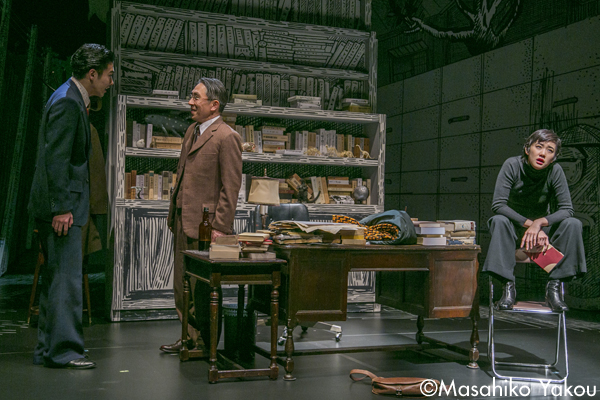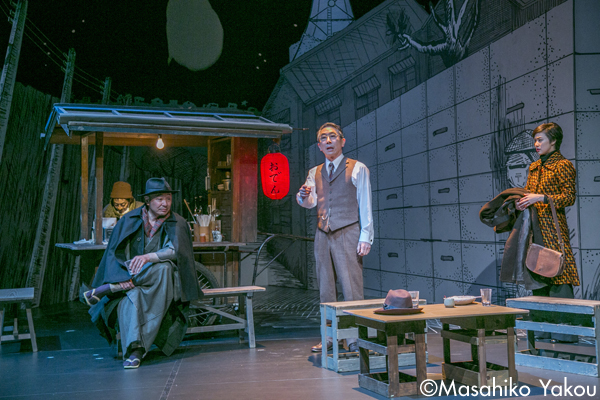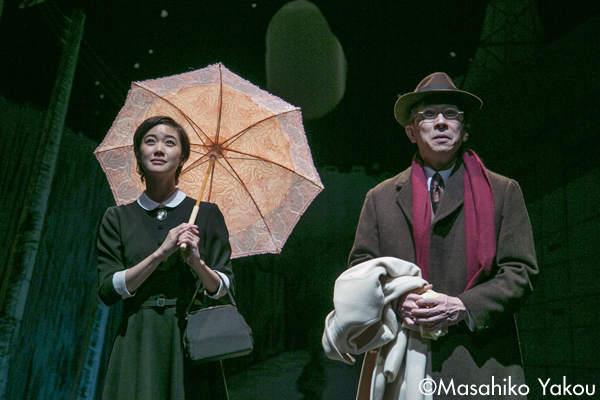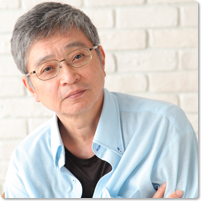Scene 1: At a university professor’s office.
Professor Komura is complaining to his assistant named Toyama. Komura has been interviewing applicants for a position as his secretary, and despite the fact that he had specified that one of the requirements for applicants be that they are women of beauty, not one to applicants has met that qualification. Komura says that he will meet just one more applicant and then quit the interviews. The 30th and last of the applicants to be led into his office is Rina Mimai. Seeing her beauty, Komura decides on the spot to hire Rina.
The job relegated to Rina as the new secretary is to pose as Komura fiancé as he visits the homes of his eight lovers and help him make settlements to end the relationships with them.
The authorities at the university have found out that despite Komura’s marriage to the university’s president a year ago, he has not terminated his relationships with his lovers, and he has been commanded to make settlements to end the relationships before April. If he cannot dissolve these relationships, he will lose his seat as a professor at the university.
Rina rants on about the absurdity of this assignment in her Kawachi dialect. Komura and Toyama wince at the vulgarity of her strong accent. When they begin to consider not hiring her, Rina rebuts, saying that she only speaks the Kawachi dialect and tells them to explain what’s wrong with it to begin with. Komura decides to hire her anyway, saying that it will be OK as long as she doesn’t speak.
When Komura leaves and Toyama and Rina are left alone, they begin speaking on intimate terms, Rina now in a normal Tokyo accent. It appears that they already know each other as friends and there is a scheme brewing.
Scene 2: At a street stall serving
oden
(stewed vegetables, fish dumplings, etc.)
This
oden
street stall is where Toyama and Rina frequently meet. Rina tells him that she and Komura succeeded in ending the relationship with one of the “lovers,” a beauty salon owner. She adds that the final word “goodbye” that they agreed should be used in the parting also worked well. But, it appears that the stall owner has some recollection connected with Rina.
A man at the stall who appears to be a regular customer is from the Dotonbori district of Osaka and he seems suspect of Rina’s Kawachi accent, so he asks her to sing the famous Kawachi Ballad folk song to test her. Rina says that she doesn’t remember all of the words, but she manages to sing the song to the end.
Scene 3: At noon, the following day.
Rina and Komura meet at the oden stall before going to the house of the next lover they will visit. Komura begins to tell Rina stories about his deceased wife who was such a caring person that people used to call her “Lady Kindness” before she passed away at the age of 48. Komura also tells Rina that the lover they are about to meet has previously asked him to join her in a love suicide, and so it is not likely that she will easily agree to part.
Scene 4: In the evening at the oden stall.
Komura is talking to Rina, reminiscing again about his late wife. He relates the fact that she had a miscarriage, and that once on her birthday he had given her a parasol as a present. Rina is beginning to be touched by the depth of the love he had for his wife. When Komura starts to ask Rina about her native Kawachi, a woman at the stall (played by the singer songwriter Hako Yamazaki in the premiere production) begins to play the guitar and sing her own song “A Sibling Suicide” based on the Kawachi Ballad.
Scene 5: At the professor’s office.
Rina is reporting to Toyama that she and Komura have succeeded in settling the relationships with five of the eight lovers. Toyama has been promised a post as an associate professor by Komura’s current wife, the president of the university, when the settlements with all eight of the lovers are complete, and she has also promised cover the costs of Toyama’s upcoming wedding.
In fact, Rina is Toyama’s fiancé, and the ruse of having her speak in the fake Kawachi dialect is an idea he came up with to prevent Komura from attempting to make her his a ninth lover.
Scene 6: At the oden stall before opening.
The stall’s owner is surprised at first when Rina suddenly starts speaking to him like a Tokyoite without the Kawachi accent, but he takes it in stride, because he is not one to stick his nose into the private lives of his customers. Instead, he begins telling her about his memories of the old days when Komura and his late wife used to come to drink at his stall as young lovers.
Scene 7: At a store for Western style clothes and goods.
Komura is selecting a parasol. He plans to give it to Rina as a token of his appreciation once the settlements with the eight lovers are completed. The one he chooses is very much like the one he gave his late wife, and by mistake he writes her name on the gift card.
Scene 8: At the oden stall.
Komura and Rina are meeting here to go one the last of eight separation settlement visits. Speaking to him now without her false Kawachi accent, Rina tells Komura that she thinks the eight women weren’t really his “lovers” in the usual meaning of the word.
Rina confesses to him that she had returned to the homes of each of the women after the initial “break-up” visits and learned that in each case there had never been any “physical” relationship and that they were women who had only been grateful recipients of his financial and emotional support in times of need. Rina then asks him if these efforts to help women in need weren’t in fact a form of nostalgia for his late wife’s kindness to people and an attempt to replace the loss of his true lover.
Without pretense, Komura admits that he hadn’t been able to live with the thought that love was gone from his life forever when his wife died. He then relieves Rina of her post as his secretary and the two part with a final “goodbye.” As Komura breaks down in tears, his long-time acquaintance, the stall owner comes and tells him that he has got to be true to his feelings and, with a push on the back, sends him off in pursuit of Rina.
Scene 9: On the street.
Komura runs and finds Rina lingering not far away. He offers her the parasol he had intended to give her. Snow has begun to fall, and when Rina opens the parasol a flurry of cherry blossoms floats down.
As if in celebration of the newly born romance between a late middle-aged man and a young woman, Hako Yamazaki sings the song “Parasol in the Night” (lyrics by Soh Kitamura).





